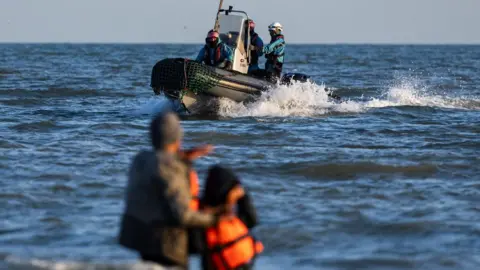## The Escalating Crisis of Small Boat Crossings in the English Channel
Downing Street has raised alarms regarding the deteriorating situation concerning small boat crossings in the English Channel, just ahead of a critical UK-France summit focused on border security. In recent discussions, particularly at the G7 summit held in Canada, Sir Keir Starmer, the leader of the opposition Labour Party, and French President Emmanuel Macron have pledged to collaborate more closely to mitigate this escalating crisis.
The spokesperson from No 10 emphasized the necessity of making migration a central theme during President Macron’s planned state visit, which is set for July 8 to July 10. These discussions come at a crucial point as official figures from the UK authorities reveal that over 1,500 migrants undertook dangerous crossings in small boats last week alone, bringing the yearly total to just over 16,000—a staggering 42% increase compared to the same period in the previous year.
## Increasing Escalation and Responses
The commitment between Starmer and Macron aims to derive high-impact solutions that would serve both the British and French citizens amidst this pressing issue. The spokesperson reiterated, “Migration should be a key focus given the deteriorating situation in the Channel.” Additionally, ministers are pressing the French government to enact new policies that would allow for easier interception of boats attempting the perilous journey.
In a deal struck in 2023, the former Conservative government allocated nearly £500 million to France over a three-year period to fund extra officers dedicated to curbing unauthorized migration crossings. Yet, the efficacy of these measures is questionable, as current statics indicate that French authorities have only managed to intercept around 58% of the recorded crossings in 2023.
## Government Measures and Policy Response
This year, March saw Home Secretary Yvette Cooper highlighting that the French government was reassessing its policies regarding policing small boat crossings. Notably, reports in recent days have indicated a more robust and aggressive approach from French law enforcement, as demonstrated by the use of tear gas and batons against migrants attempting to board dinghies near Gravelines in Calais.
Labour has prioritized in its campaign a commitment to “smash the criminal boat gangs,” which has now gained greater urgency as migration to the UK continues to surge. This commitment from Sir Keir Starmer reflects an acknowledgment that addressing illegal immigration and enhancing the structure of the asylum system is vital for national security.
Since Labour took office in July 2024, however, numbers of Channel crossings have escalated to 40,000, marking a 21% increase over the corresponding period last year. Despite the interception of 940 boats—amounting to nearly 28,000 prevented migrant entries—the challenge remains significant.
The government has pointed to various factors driving this spike in crossings, including favorable weather conditions and the actions of people smugglers. In response to the rising numbers, Conservative members have accused the Labour government of shifting blame for the situation, claiming that attributing problems to weather patterns deflects from broader systemic issues.
## Conclusion: The Need for Cooperative Solutions
As political tension rises and statistics reveal ongoing struggles, both the British and French governments recognize that a multifaceted approach is crucial to tackle the worsening migration crisis in the Channel. The agreements formed between UK and French leaders signal an intention to address this issue head-on on international platforms, yet tangible interventions will need to follow these discussions to result in meaningful change.
In addition, as both Labour and Conservative parties grapple with the ongoing situation and public sentiment, cross-party cooperation may be necessary to enforce successful migration policy reforms and assure the safety of individuals willing to risk their lives in searches for better futures. The path forward requires understanding, collaboration, and effective strategies to ensure these waters are made safer for all involved.



